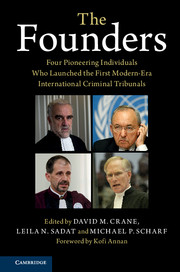 The Founders
The Founders 4 - The International Criminal Tribunals for the Former Yugoslavia and Rwanda
from PART II - THE FOUNDERS
Published online by Cambridge University Press: 23 March 2018
Summary
After graduating from Witwatersrand University School of Law in 1962, I practiced for 17 years at the Johannesburg Bar. My practice was almost exclusively in the field of commercial law. As a young barrister, I did my share of pro bono criminal defenses in the High Court, but that was the extent of my criminal trial experience, save for a long and complex commercial fraud trial that lasted for some nine months in Durban. In 1977, during that trial my application for senior status (the English Bar equivalent of Queen's Counsel) was granted.
Between 1978 and 1980, I accepted three short acting appointments on what was then called the Transvaal Supreme Court (today called the Gauteng High Court). During the first half of 1980, I was invited by the minister of justice to accept a permanent appointment on the Court. This presented me with an excruciatingly difficult decision. From my student days I had been involved in activities designed to bring to an end the evil system of apartheid. I had served as the president of the student council at the University of the Witwatersrand that had actively opposed attempts by the government to segregate what it regarded as a “white university.” I had also served on the executive committee of the National Union of South African Students (NUSAS), an organization that was also strongly anti-apartheid and an anathema to the government. As a form of retribution, for some years the apartheid government denied me a passport.
A few anti-apartheid lawyers had accepted appointments to the bench with the intention of ameliorating the harsh application of the racially oppressive laws that then applied to the black majority. One of them, John Didcott, was a role model. He was a former leader of the student council at the University of Natal and a member of the Executive Committee of NUSAS. He quickly made a name for himself as the author of well-written opinions that castigated racist laws and for issuing astute decisions that had the effect of blunting some of the harsh consequences of some oppressive laws.
- Type
- Chapter
- Information
- The FoundersFour Pioneering Individuals Who Launched the First Modern-Era International Criminal Tribunals, pp. 55 - 73Publisher: Cambridge University PressPrint publication year: 2018


